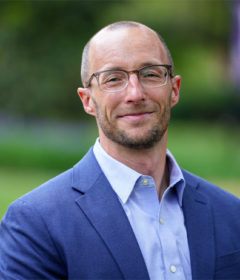A National Debate About Values
 This is the third of four stories in a series entitled Values Quest, featured in the Summer 2014 Stetson Magazine.
This is the third of four stories in a series entitled Values Quest, featured in the Summer 2014 Stetson Magazine.
A Cold, Clinical Place
Stanley Fish, a Milton scholar, former dean of the University of Illinois-Chicago College of Arts and Sciences, former head of the Duke English Department and a New York Times columnist, wants a cold, clinical classroom. Quite simply, he offers an opposing view and sees danger behind institutional support of certain values.
The author of The Trouble With Principle and Save the World on Your Own Time, Fish sees universities as places over-saturated with political quests that get away from the search for truth, what he believes is the original mission of the university. He wants a classroom devoid of political and values-based pollution. In other words, he believes that university and college professors should stick with what they know best — their disciplines — and teach those disciplines well. The other stuff keeps them from doing that, he postulates.
“These days, everyone, whether speaking from the left or the right, says the same thing — colleges and universities are in a sorry state, and ideology is the problem,” Fish writes.
Fish lampoons universities’ and colleges’ values statements. Read these, he writes, “and you will find claims and ambitions that will lead you to think that it is the job of an institution of higher learning to cure every ill the world has ever known.” Fish includes “not only illiteracy and cultural ignorance, which are at least in the ball-park, but poverty, war, racism, gender bias, bad character, discrimination, intolerance, environmental pollution, rampant capitalism, American imperialism, and the hegemony of Wal-Mart; and of course the list could be much longer.
“I’m all for moral, civic and creative capacities, but I’m not sure that there is much I or anyone else could do as a teacher to develop them,” Fish declares. “Moral capacities (or their absence) have no relationship whatsoever to the reading of novels, the running of statistical programs, or the execution of laboratory procedures, all of which can produce certain skills, but not moral states.”
Therefore, what should colleges and universities do? “College and university teachers can (legitimately) do two things,” he writes. They can “1) introduce students to bodies of knowledge and traditions of inquiry that had not previously been part of their experience; and 2) equip those same students with the analytical skills — of argument, statistical modeling, laboratory procedure — that will enable them to move confidently within those traditions and to engage in independent research after a course is over.” To put it bluntly, he writes, “Teachers cannot, except for serendipity that by definition cannot be counted on, fashion moral character, or inculcate respect for others, or produce citizens of a certain temper.” He calls these nonacademic purposes.
He urges professors to “do your job, don’t try to do someone else’s job, and don’t let anyone else do your job.”
Fish is concerned about one thing in particular. “The neoconservative attack on the academy and especially the charge that left-leaning teachers are corrupting our youth by teaching relativism, atheism, and a disdain for truth. Neoconservatives want an academy where their politics are given a proportional representation (they call it balance or intellectual diversity) in the selection of texts and faculty members. I want an academy inflected by no one’s politics, but by the nitty-gritty obligations of teaching and research.”
Maybe he’s right. In a Washington Post article titled “Texas GOP rejects ‘critical thinking’ skills. Really,” the author Valerie Strauss writes about the 2012 platform, which states: “We oppose the teaching of Higher Order Thinking Skills (HOTS) (values clarification), critical thinking skills and similar programs that are simply a relabeling of Outcome-Based Education (OBE) (mastery learning) which focus on behavior modification and have the purpose of challenging the student’s fixed beliefs and undermining parental authority.”
It’s as if Socrates is on trial all over again for corrupting the youth of Athens. But how can professors teach almost any class and avoid a values discussion?
In his article on the Association of American Colleges and Universities website, Mark Roche, the Rev. Edmund P. Joyce, C.S.C. Professor of German Language and Literature at Notre Dame, summarizes the argument: “Stanley Fish argues that faculty members should not educate students in values but should focus on instructing them in the methodologies of the disciplines.” Roche cites a faculty survey where only a fraction “viewed … ‘develop personal values’ as ‘very important’ or ‘essential.’ ”
Furthermore, Roche gives some background for this belief. “Early in the 20th Century, Max Weber (1946) argued for the separation of knowledge and morality, insisting that values are not scientific and cannot be defended via reason,” he writes. “In The Making of the Modern University (1996), Julie Reuben tells the story of how American higher education has increasingly moved toward this separation of knowledge and morality.”
Roche believes faculty members also have trouble addressing values because of “versions of character development, which tend toward ready-made answers and moral indoctrination.” And he notes another problem that faculty might have. “The fear of hypocrisy diminishes the voices of those who are modest enough to recognize their own weaknesses,” he writes. His conundrum: “On the one hand, college does not and should not teach values. On the other hand, college helps students develop values and become better persons.”
However, faculty can’t help but examine values in the classroom, according to Roche. For example, “To listen carefully to the views of others and to weigh them honestly, giving them a full hearing with your utmost attention, even if they should contradict your initial inclinations, is to practice a form of justice,” he writes.
And Roche believes that despite their reluctance to bring an examination of values into the classroom, faculty still “lament that today’s students are too oriented toward material gain and insufficiently interested in values.”
Similarly, Patricia Bizzell, English professor at the College of the Holy Cross, counters Fish’s arguments as well. She teaches composition studies and sets as her lofty goal to “contribute to making the world a better place.”
“I must see all my classroom work as deeply imbued with my moral values,” she writes in her piece “Composition Studies Saves the World.” “My morality can no longer be regarded as purely private and personal, as Weber and Fish would have it.”
In short, she understands that she can’t help but bring her personal values into the classroom. While teaching her students the skills of composition, therefore, “we can assign materials that raise issues of social justice and foster reflection on rhetorical methods of engaging them.” Thus, isn’t a professor who chooses books and readings for his or her class automatically declaring value to certain ideas?
Stetson Students Have a Social Conscience
Karen Ryan, Ph.D., dean of the College of Arts and Sciences, contends that students who come to Stetson are those who want to embrace and explore values. “They have a social conscience and want to serve something greater than themselves, being a global citizen and being of service to the world.”
First-year student Kalee Ball, an editorial assistant for this magazine, for example, says she chose Stetson because of its stance on environmental issues.
And Ryan believes that this comes out in Stetson classes. “For example, we are developing a program in environmental sciences, and that’s going to be focused very heavily on freshwater studies,” she explains. “It makes sense because we are located in a place where freshwater springs, estuaries, rivers, wetlands and lakes are all endangered. In focusing our intellectual powers here, we are obviously inculcating a sense of responsibility in our students and in those in our community that we need to conserve and preserve these resources.
“As we teach and learn about the freshwater resources in our immediate environment, we are also talking about values,” she elaborates. “These are value judgments.”
Values are ingrained in what Stetson does, according to Ryan. “We really grapple with values here, and that’s our core. That’s the heart of who we are,” she adds. “The liberal arts are basically about exploration and inquiry, and those lead to self-reflection about all your preconceptions. They lead to an examined life.
“We want our students to ask the big questions,” she points out. “Why am I here? What is my purpose? What do I want to do with my life?” Ryan also recognizes that some faculty “really feel they shouldn’t be expressing their personal views about politics or religion or social issues, wherever they come down on these things, that it should all be objective and neutral. But we’re teaching our students to think critically, so hopefully we are teaching them to examine these values critically and to think about them in different ways.”
by Bill Noblitt, editor of Stetson Magazine



